反义疑问句讲解 练习
反义疑问句的讲解及练习(含答案)
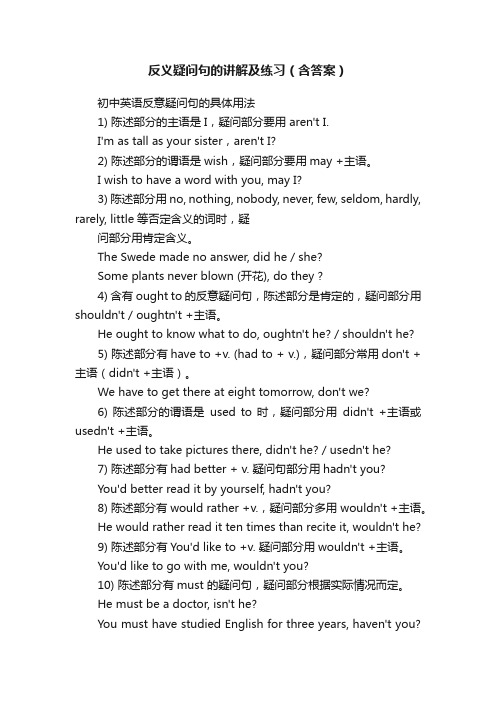
反义疑问句的讲解及练习(含答案)初中英语反意疑问句的具体用法1) 陈述部分的主语是I,疑问部分要用 aren't I.I'm as tall as your sister,aren't I?2) 陈述部分的谓语是wish,疑问部分要用may +主语。
I wish to have a word with you, may I?3) 陈述部分用 no, nothing, nobody, never, few, seldom, hardly, rarely, little等否定含义的词时,疑问部分用肯定含义。
The Swede made no answer, did he / she?Some plants never blown (开花), do they ?4) 含有ought to 的反意疑问句,陈述部分是肯定的,疑问部分用shouldn't / oughtn't +主语。
He ought to know what to do, oughtn't he? / shouldn't he?5) 陈述部分有have to +v. (had to + v.),疑问部分常用don't +主语(didn't +主语)。
We have to get there at eight tomorrow, don't we?6) 陈述部分的谓语是used to 时,疑问部分用didn't +主语或usedn't +主语。
He used to take pictures there, didn't he? / usedn't he?7) 陈述部分有had better + v. 疑问句部分用hadn't you?You'd better read it by yourself, hadn't you?8) 陈述部分有would rather +v.,疑问部分多用 wouldn't +主语。
反义疑问句详细讲解及操练(提高班用)

英语提高班学习资料(1)---初中英语语法之反义疑问句注意一、反义疑问句是疑问句的一种,它对陈述部分的事实提出相反的疑问,形式上是一个省略问句,附加在陈述句后,即:陈述句+逗号+省略问句+问号You are from America,aren’t you?注意二、遵循前否定后肯定或前肯定后否定的原则(但在祈使句等一些特殊句子中需注意,详细见注意七)Jim isn’t in Class Four,is he?注意三、附加疑问句必须前后两句主语相同Mr Zhang has been here for four years,h asn’t he?注意四、附加疑问句部分与主语不一致的若干情况如下(需牢记)1.this或that改it,无论是否指人This is your brother,isn’t it?2.these或those改theyThose are books,aren’t they?3.不定代词one改one或heOne can’t be always young,can one/he ?4.something、anything、everything和nothing改itNothing is serious,is it?(注意为什么后面用is it而不是isn’t it?)真的不掉线吗??、????????????Everything seems all right,doesn’t it ?5.everybody、everyone、somebody、someone、anybody、anyone、nobody改they 或he(任选,但选定后注意单复数形式)真的不掉线吗??、????????????Everyone knows this,don’t they/does n’t he?Nobody likes to lose money,does he?(这里最好用he)6.each of改he或theyEach of the boys had an apple,didn’t h e/they?7.no one,none,neither,either改they或heNo one came,did they?8.some of…、none of…改it、they或you(联系上下文或句子)None of the food was delicious,was it ?Some of the dustmen have e back,haven ’t they?9.由neither…nor…、not only…but also、both…and…、either…or…、not…but…、…or…、…and…等连接的并列主语,改复数代词Neither you nor I am wrong,are we?Both Tom and Jack came,didn’t they?10.由动词不定式、动名词、从句或词组构成的主语,改itTo learn English well isn’t easy,is i t?Swimming is great fun,isn’t it?真的不掉线吗??、????????????11.the+形容词表示一类人,改复数代词The poor had no right(权力)to speak at the time,did they?12.there引起的句子(There be句型等),仍用thereThere stands a house and a lot of tree s,doesn’t there?There are many children in the park,a ren’t there?注意五、附加疑问句部分与谓语不一致的若干情况如下(需牢记)(初中阶段14点18点和19点可以常识性了解)1.have(有)改have或doMary has two brothers,doesn’t she/has n’t she?2.have(有)必须与陈述部分一致He hasn’t a lot of time,has he?Miss Green doesn’t have any money in her pocket,does she?3.have不做“有”解释,必须用doThey all have a good time,don’t they?4.have to用do或haveWe have to get up early,don’t we/have n’t we?5.have got to用haveWe have got to answer all the questions ,haven’t we?6.had better用should或hadWe had better go right now,shouldn’t we /hadn’t we?真的不掉线吗??、????????????7.can’t(不可能,表示推测)根据can’t 或的动词选择相应的形式He can’t be a doctor,is he?The workers can’t have finished their w ork,have they?8.may用may+主语+not(英语中不用mayn’t)They may be here next week,may they not ?9.must(必须)用needn’tYou must do it today,needn’t you?10.must(应该)用mustn’tI must study hard,mustn’t I?11.mustn’t用must或mayYou mustn’t talk like that,must you?We mustn’t stay here any longer,must we ?12.“must be”对现在情况进行推测作一般现在时或现在进行时的附加疑问句进行处理2反义疑问句He must be happy,isn’t he?He must be working hard at the office,i sn’t he?must表示推测时,也有用mustn’t的He must have been working very hard,mu stn’t he?You must have told Mr Wang the secret,m ustn’t you?真的不掉线吗??、????????????13.“must+完成时”表示对过去情况的推测,作一般过去时附加疑问句处理He must have e yesterday,didn’t he?You must have seen the play last week,d idn’t you?14.“must+完成时”用来推测过去的动作持续到现在按现在完成时的附加疑问句来处理You must have studied English for year s,haven’t you?He must have lived here for at least t en years,hasn’t he?14.实义动词need和dear用doHe needs help,doesn’t he?I have never dared to ask him,have I?15.情态动词need和dear用need和dearHe dare not say so,dare he?We need not do it again,need we?16.needn’t用need或mustYou needn’t go yet,need you?He needn’t do that,must he?17.“would rather+动词原形”和“would like to+动词原形”用wouldn’tHe would rather read the text ten time s than recite it,wouldn’t he?You’d like to have some bananas,would n’t you?18.“ought to+动词原形”用oughtn’t或shouldn’t真的不掉线吗??、????????????The child ought to be punished,oughtn’t he?We ought to go there,shouldn’t we?19.“used to+动词原形”用“didn’t+主语”或“usedn’t+主语”或“used+主语+not”He used to live in London,usedn’t he/ didn’t he?He used to play football when he was a c hild,used he not?注意六、句子中有seldom,hardly,no,not,never,few,little ,nothing,nobody,nowhere等是否定句,附加疑问部分必须采用肯定形式Nobody phoned while I was out,did the y?He is hardly able to swim,is he?There is little ink in your pen,is th ere?no one,nobody,none,nothing,neither 等作动词的宾语时,附加疑问部分一般采用肯定形式(也偶尔用否定形式)He has nothing to say,does(n’t)he?You got nothing from him,did(n’t)you ?注意七、一些特殊句型的附加疑问句1.I am…改aren’t II am your friend,aren’t I?2.I wish to do sth或I wish I…改may II wish to go home,may I?I wish I were you,may I?真的不掉线吗??、????????????3.主从复合句,与主句的主谓语保持一致He says that I did it,doesn’t he?David wouldn’t go there if it rained, would he?4.并列句,与邻近的分句保持一致Mary is a nice girl,but she had one sh ort-ing,hadn’t she?5.表示邀请,请求的祈使句,附加疑问部分用will you或won’t you或would you等,一般只要记住will you就可以了,不遵循前否定后肯定或前肯定后否定的原则e here,will you?Turn off the light,will you?Do sit down,will you?6.表示告诉别人做某事的祈使句,用will you、can you、would you或can’t you、won’t youStop talking,can you?Write down the new words,will you/w on’t you?7.否定的祈使句用will you或can youDon’t make a noise,will/can you?8.Let me…用will you或may ILet me help you,may I?Let me do it,will you?9.Let’s…表示建议包括听话人在内,用shall we真的不掉线吗??、????????????Let’s go for a walk,shall we?10.let us…表示允许,不包括听话人在内,用will youLet us do it by ourselves,will you?11.Let接第三人称宾语时用will youLet him e in,will you?12.Let’s not…用OK或all rightLet’s not go to the party,OK/all rig ht?13.感叹句用一般现在时be的形式(故事中用一般过去时be的形式)What fine weather,isn’t it?How clever the boy is,isn’t he?How hard she works,isn’t she?反义疑问句练习题目:1.Linda ate nothing this morning,___?A.didn’t sheB.was sheC.did sheD.wa sn’t she2.There’s hardly___milk in the bottle ,_____there?A.no,isn’tB.some,isC.little,isn’tD.any,is3.He has never ridden a horse before,_ __?A.does heB.has heC.hasn’t heD.does n’t he4.—He seldom came here,_____?—Yes sir.真的不掉线吗??、????????????A.didn’t heB.does heC.doesn’t heD. did he5.Everything seems all right,_____?A.does itB.don’t theyC.won’t itD.d oesn’t it7.One can’t be too modest,can_____?A.oneB.heC.itD.we8.No one failed in the exam,_____?A.was heB.did oneC.did theyD.didn’t he10.Neither you nor I am a artist,_____ ?A.am IB.aren’t weC.are weD.ain’t I11.He can’t be her father,_____he?A.isB.isn’tC.canD.can’t12.They have no time to visit the museu m,_____?A.do theyB.haven’t theyC.don’t theyD.will they14.You’d better go at once,_____you?A.hadn’tB.didC.didn’tD.don’t15.You’d rather work than play,_____y ou?A.hadn’tB.wouldn’tC.didn’tD.mustn’t16.You dare not do that,_____you?A.don’tB.doC.dareD.daren’t18.He dislikes the two subjects,_____ he?A.doesB.doesn’tC.isD.isn’t19.These tools are useless now,_____ ?A.are theyB.aren’t theyC.is itD.is n’t it20.He used to get up at6:30,_____he?A.didn’t heB.did heed heD.woul dn’t he22.He ought to win the first prize,___ ____he?A.mustn’tB.oughtn’tC.shouldn’tD.B oth B and C.23.Let’s go there by bus,___?A.will youB.shall weC.don’t youD.w ill you24.Let us go to play football,___?A.will youB.shall weC.do weD.are w e25.Don’t forget to give Polly some food and change her water,___?A.will youB.shall weC.won’t youD.d o you26.—Let’s go shopping this afternoon ,_____?—All right.A.will weB.shall weC.don’t weD.are we27.—Pass me the dictionary,_____?—Yes,with pleasure.A.would youB.will youC.won’t youD. wouldn’t you30.There is little water in the glass, ____?A.isn’t thereB.isn’t itC.is itD.is there32.There won’t be any concert this Satu rday evening,_____?A.will there notB.will thereC.is th ereD.won’t33.—I guess she taught herself Japan ese,______?—Yes.A.don’t IB.did sheC.do ID.didn’t sh e34.I don’t believe you are right,_____ ?A.are youB.do youC.won’t youD.do35.She doesn’t think that Tom sings bes t in the class,_____?A.does sheB.doesn’t sheC.does heD. doesn’t he37.I know you didn’t want to hurt me,_ ____?A.did youB.didn’t youC.do ID.don’t I38.If my father were here,he would be very happy,_____?A.weren’t heB.were heC.wouldn’t he D .would heKey:1—5CDBDD6—10BACDC11—15AABA B16—20CCBBA21—25CDBAA26—30BBBAD31—35BBDAA36—38AAC真的不掉线吗??、????????????II. 形容词比较级和最高级的变化规则A. 三级的形成形容词可用来表达三种不同的程度:1. 原级用在描述与比较对象之间的性质相同。
反义疑问句句知识点+习题

反义疑问句一、学习反意疑问句,特别要注意的问题1)陈述部分的主语是this, that时,疑问部分的主语多用it;陈述部分的主语是these, those时,疑问部分的主语多用they如:This is a dictionary, isn’t it?Those are shelves, aren’t they?2)陈述句如果是there be结构时,疑问句部分仍用there。
如:There once was a man named Saint Nicholas, wasn’t there?3)在英语口语中,“I am +表语结构”,后面的反意疑问句多用aren’t I来体现。
如:I am very interested in learning English, aren’t I?4)陈述句的主语是动词不定式,动词的-ing形式或从句时,疑问部分的主语多用it来体现。
如:Taking care of our environment is very important, isn’t it?What he said is right, isn’t it?5)陈述句中含有not, no, hardly, neither, never, few, little, too …to等否定词或具有否定意义的词时,疑问部分常用肯定形式。
如:Few people knew the news, did they?Tom has never been to England , has he?但陈述句中如果带有否定意义的前缀和后缀的单词时,整个句子仍视为肯定句,反意疑问部分多用否定形式。
如:She is unhappy, isn’t she?6)陈述句的主语是nobody, no one, everyone, somebody等不定代词时,反意疑问部分的主语多用they (当强调全体时)或he(当强调个体时)。
如果陈述句的主语是something, nothing, anything, everything 等不定代词时,反意疑问部分的主语多用it。
初一英语反意疑问句讲解及练习
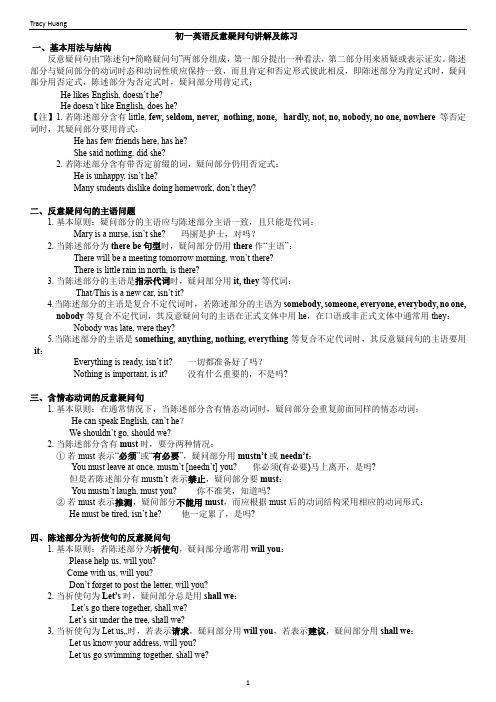
初一英语反意疑问句讲解及练习一、基本用法与结构反意疑问句由“陈述句+简略疑问句”两部分组成,第一部分提出一种看法,第二部分用来质疑或表示证实。
陈述部分与疑问部分的动词时态和动词性质应保持一致,而且肯定和否定形式彼此相反,即陈述部分为肯定式时,疑问部分用否定式,陈述部分为否定式时,疑问部分用肯定式:He likes English,doesn’t he?He doesn’t like English,does he?【注】1.若陈述部分含有little, few, seldom, never,nothing, none, hardly,not, no, nobody, no one, nowhere 等否定词时,其疑问部分要用肯式:He has few friends here,has he?She said nothing,did she?2.若陈述部分含有带否定前缀的词,疑问部分仍用否定式:He is unhappy, isn’t he?Many students dislike doing homework, don’t they?二、反意疑问句的主语问题1.基本原则:疑问部分的主语应与陈述部分主语一致,且只能是代词:Mary is a nurse,isn’t she? 玛丽是护士,对吗?2.当陈述部分为there be句型时,疑问部分仍用there作“主语”:There will be a meeting tomorrow morning, won’t there?There is little rain in north, is there?3.当陈述部分的主语是指示代词时,疑问部分用it,they等代词:That/This is a new car,isn’t it?4.当陈述部分的主语是复合不定代词时,若陈述部分的主语为somebody, someone, everyone, everybody, no one,nobody等复合不定代词,其反意疑问句的主语在正式文体中用he,在口语或非正式文体中通常用they:Nobody was late,were they?5.当陈述部分的主语是something,anything,nothing,everything等复合不定代词时,其反意疑问句的主语要用it:Everything is ready,isn’t it? 一切都准备好了吗?Nothing is important,is it?没有什么重要的,不是吗?三、含情态动词的反意疑问句1.基本原则:在通常情况下,当陈述部分含有情态动词时,疑问部分会重复前面同样的情态动词:He can speak English,can’t he?We shouldn’t go,should we?2.当陈述部分含有must时,要分两种情况:①若must表示“必须”或“有必要”,疑问部分用mustn’t或needn’t:You must leave at once,mustn’t[needn’t]you?你必须(有必要)马上离开,是吗?但是若陈述部分有mustn’t表示禁止,疑问部分要must:You mustn’t laugh,must you?你不准笑,知道吗?②若must表示推测,疑问部分不能用must,而应根据must后的动词结构采用相应的动词形式:He must be tired,isn’t he?他一定累了,是吗?四、陈述部分为祈使句的反意疑问句1.基本原则:若陈述部分为祈使句,疑问部分通常用will you:Please help us,will you?Come with us,will you?Don’t forget to post the letter,will you?2.当祈使句为Let’s时,疑问部分总是用shall we:Let’s go there together,shall we?Let’s sit under the tree,shall we?3.当祈使句为Let us…时,若表示请求,疑问部分用will you,若表示建议,疑问部分用shall we:Let us know your address,will you?Let us go swimming together,shall we?五、陈述部分为主从复合句的反意疑问句1.当陈述部分为主从复合句【主句+从句】时,疑问部分一般应与主句保持一致:He said that he didn’t like it,didn’t he?He knows where I live,doesn’t he?2.当陈述部分为I think(believe,suppose)that...等时,疑问部分通常与从句保持一致(注意否定的转移):I think it is too short,isn’t it?I don’t think he will come,will he?【注】这类用法主要限于主语为第一人称且think等动词为一般现在时的情形。
史上最全最有方法的反义疑问句讲解及练习

反义疑问句1、反意疑问句的前半句是陈述句,当然是按老惯例用降调。
而后半句是简短问句,当然就用升调了。
不过有时说话人对陈述部分把握较大,只是象征性地征求一下意见,这后半部分就得用降调了。
It's very cold today, ↘isn't it ↘ (说话时天气确实很冷。
)You're from England, ↘aren't you↗ (说话时,对对方是否来自England,把握不大。
)2、现在你已知道怎样向别人说这个带尾巴的句子了。
反过来,要是别人问你:It's very cold today, isn't it 你该怎么回答呢反意疑问句的回答法跟一般疑问句的回答方式完全一样。
例如:She is good at English, isn't she回答可以是:Yes, she is. 或者No, she isn't. 注意,回答一定要和实际情况相符合,“是”就“是”,“不是”就“不是”。
也就是说回答反意疑问句要遵循“实事求是”的原则,肯定的答案就用yes+肯定结构;否定的答案就用no+否定结构。
答案要和实际情况相符。
那怎样回答There is a computer in your room, isn't there 这个句子呢你房间里确实有台电脑,那么回答就是:Yes, there is.3、不过,我们现在只练习了一种反意疑问句,即:前一部分为肯定式,后一部分是否定式。
There isn't a computer in your room, is there“你的房间里没有电脑,对吗”你该怎么回答呢根据中国人的思维,反应在你脑海中的肯定是,“不对,我房间里有电脑。
” 便顺口回答道:No, there is. 这样,可就大错特错了。
因为你违背了“事实求是”的原则:肯定的答案就用yes+肯定结构;否定的答案就用no+否定结构。
英语反义疑问句讲解及练习题(3)
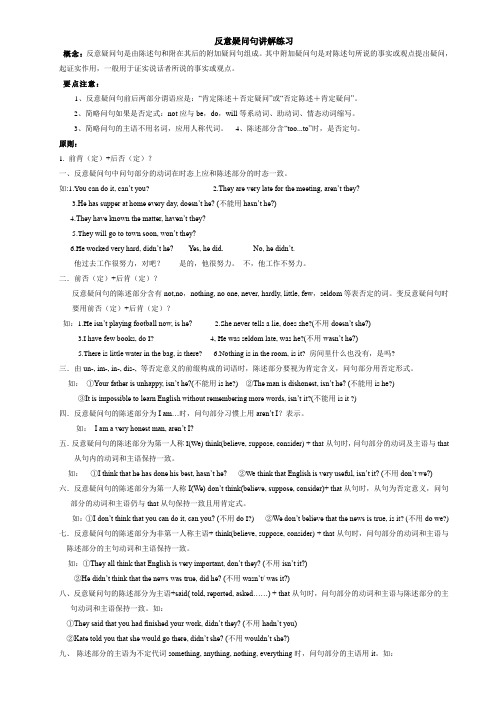
反意疑问句讲解练习概念:反意疑问句是由陈述句和附在其后的附加疑问句组成。
其中附加疑问句是对陈述句所说的事实或观点提出疑问,起证实作用,一般用于证实说话者所说的事实或观点。
要点注意:1、反意疑问句前后两部分谓语应是:“肯定陈述+否定疑问”或“否定陈述+肯定疑问”。
2、简略问句如果是否定式:not应与be,do,will等系动词、助动词、情态动词缩写。
3、简略问句的主语不用名词,应用人称代词。
4、陈述部分含“too...to”时,是否定句。
原则:1. 前肯(定)+后否(定)?一、反意疑问句中问句部分的动词在时态上应和陈述部分的时态一致。
如:1.You can do it, can’t you? 2.They are very late for the meeting, aren’t they?3.He has supper at home every day, doesn’t he? (不能用hasn’t he?)4.They have known the matter, haven’t they?5.They will go to town soon, won’t they?6.He worked very hard, did n’t he? Yes, he did. No, he didn’t.他过去工作很努力,对吧?是的,他很努力。
不,他工作不努力。
二.前否(定)+后肯(定)?反意疑问句的陈述部分含有not,no,nothing, no one, never, hardly, little, few,seldom等表否定的词。
变反意疑问句时要用前否(定)+后肯(定)?如:1.He i sn’t playing football now, is he? 2.She never tells a lie, does she?(不用doesn’t she?)3.I have few books, do I? 4, He was seldom late, was he?(不用wasn’t he?)5.There is little water in the bag, is there?6.Nothing is in the room, is it? 房间里什么也没有,是吗?三.由un-, im-, in-, dis-, 等否定意义的前缀构成的词语时,陈述部分要视为肯定含义,问句部分用否定形式。
反义疑问句练习题及答案解析

反义疑问句练习题及答案解析反义疑问句是英语语法中的一种问句形式,用于在表达某种观点或态度时,征求对方的认同或否认。
反义疑问句通常由两个部分组成,主句和从句,其中主句陈述事实,并以逗号结尾,从句是对主句的反问。
以下是一些反义疑问句的练题及答案解析:1. He is a doctor, isn't he?答案:是解析:句子的主语是 "He",陈述了 "He" 是一个医生。
主句以逗号结尾,从句表达了 "He" 是一个医生这一观点,并征求对方的认同。
2. They don't like coffee, do they?答案:否解析:句子的主语是 "They",陈述了 "They" 不喜欢咖啡。
主句以逗号结尾,从句表达了 "They" 不喜欢咖啡这一观点,并征求对方的否认。
3. You can swim, can't you?答案:是解析:句子的主语是 "You",陈述了 "You" 能游泳。
主句以逗号结尾,从句表达了 "You" 能游泳这一观点,并征求对方的认同。
4. She hasn't finished her homework, has she?答案:否解析:句子的主语是"She",陈述了"She" 没有完成她的作业。
主句以逗号结尾,从句表达了 "She" 没有完成她的作业这一观点,并征求对方的否认。
5. He won't be late, will he?答案:否解析:句子的主语是 "He",陈述了 "He" 不会迟到。
主句以逗号结尾,从句表达了"He" 不会迟到这一观点,并征求对方的否认。
反义疑问句讲解与练习

反义疑问句讲解与练习一、含be(is, are, was, were)动词的反意疑问句(1)句型1:主语+ be+其它,isn’t(aren’t, wasn’t, weren’t)+ 主语?句型2:主语+ be not+其它,is(are, was, were) + 主语?① You are from America, aren’t you? Yes, I am. No, I’m not.② It isn’t very cold today, is it? Yes, it is. No,it isn’t.(2)注意:There be句型例:There is an old picture on the wall, isn’t there?二、带行为动词反意疑问句(不含be和情态动词)句型1:主语+动词+其他,do/did/does + not +主语?句型2:主语+did/does/do+not +动词原形+其他,did/do/does+其他?例:You often watch TV in the evening, don’t you? Yes, I do. No, I don’t.三、含有情态动词的反意疑问句,反义疑问句中的动词使用情态动词。
例:The students must study hard, mustn’t they? Yes, they must. No, they needn’t.注意:You must go home now, needn’t you? Yes, I must. No, I needn’t.★注意:There be句型的一般将来时① There will be a basketball match tomorrow, won’t there?Yes, there will. No, there won’t.② There won’t be too much pollution in the future, will there?Yes, there will. No, there won’t.四、反义疑问句的回答:答语要和实际情况相符合,遵循“实事求是”的原则。
(完整)反义疑问句讲解和练习(答案)
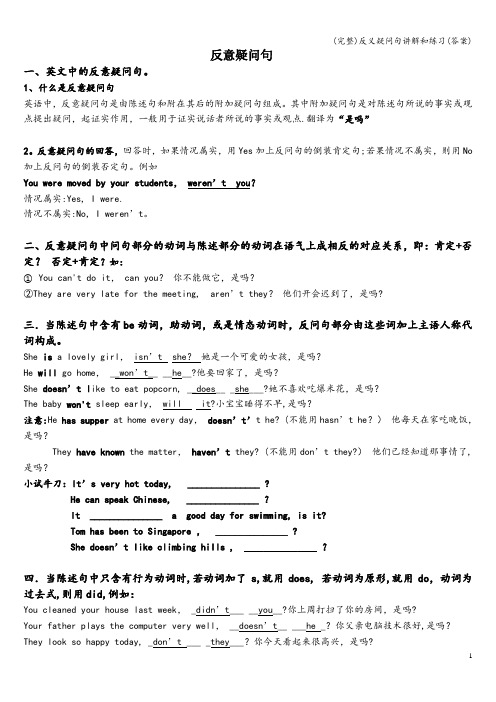
反意疑问句一、英文中的反意疑问句。
1、什么是反意疑问句英语中,反意疑问句是由陈述句和附在其后的附加疑问句组成。
其中附加疑问句是对陈述句所说的事实或观点提出疑问,起证实作用,一般用于证实说话者所说的事实或观点.翻译为“是吗”2。
反意疑问句的回答,回答时,如果情况属实,用Yes加上反问句的倒装肯定句;若果情况不属实,则用No 加上反问句的倒装否定句。
例如You were moved by your students,weren’t you?情况属实:Yes, I were.情况不属实:No, I weren’t。
二、反意疑问句中问句部分的动词与陈述部分的动词在语气上成相反的对应关系,即:肯定+否定?否定+肯定?如:①You can't do it, can you?你不能做它,是吗?②They are very late for the meeting, aren’t they?他们开会迟到了,是吗?三.当陈述句中含有be动词,助动词,或是情态动词时,反问句部分由这些词加上主语人称代词构成。
She is a lovely girl,isn’t she?她是一个可爱的女孩,是吗?He will go home, __won’t__ __he__?他要回家了,是吗?She doesn’t l ike to eat popcorn, __does__ _she___?她不喜欢吃爆米花,是吗?The baby won't sleep early, will it?小宝宝睡得不早,是吗?注意:He has supper at home every day,doesn’t’t he? (不能用hasn’t he?)他每天在家吃晚饭,是吗?They have known the matter,haven’t they? (不能用don’t they?)他们已经知道那事情了,是吗?小试牛刀:It’s very hot today, _______________ ?He can speak Chinese, _______________ ?It _______________ a good day for swimming, is it?Tom has been to Singapore , _______________ ?She do esn’t like climbing hills , _______________ ?四.当陈述句中只含有行为动词时,若动词加了s,就用does, 若动词为原形,就用do,动词为过去式,则用did,例如:You cleaned your house last week, _didn’t___ __you__?你上周打扫了你的房间,是吗?Your father plays the computer very well, __doesn’t__ ___he _?你父亲电脑技术很好,是吗?They look so happy today, _don’t ___ _they___?你今天看起来很高兴,是吗?小试牛刀: Meimei studies in a middle school, _______________ ?He loves cold weather , _______________ ?You finished the task yesterday, _______________ ?五.反意疑问句的陈述部分带有little, few, never, hardly, seldom,nobody, nothing,barely, scarcely等否定意义的词时,问句部分用肯定式.如:①She never tells a lie, does she?(不用doesn’t she?)她从不说谎,是吗?②He was seldom late, was he?(不用wasn’t he?) 他几乎不迟到,是吗?小试牛刀:Few students can answer the question, _______________ ?He can hardly finish his homework, _______________ ?六、反意疑问句的陈述部分为I am……时,问句部分习惯上用aren’t I?表示.如:I am a very honest man, aren’t I? 我是个很诚实的人,是吗?小试牛刀:I’m in Class 3,Grade 2, _______________ ?I’m ten years old, _______________ ?七.陈述部分的主语为不定代词something, anything, nothing, everything时,问句部分的主语用it。
反意疑问句语法讲解归纳与练习

4、特殊情况: I’m a student, aren’t I ? Open the door, will you?
Don’t open the door, will you/won’t you?
Let’s go home, shall we ? Let us go home, will you ? He said Lucy wasn’t there, didn’t he? I don’t think you are right, are you?
完成下列反意疑问句
aren’tБайду номын сангаасyou (1)You’re a farmer, _______ ________?
is it (2)The weather isn’t fine, ______ _____?
didn’t she (3)Kate came here last month, _____ ______?
is he (4)I don’t think Tom is at home, _____ _____? were there (5)There weren’t enough nuts, _____ _____? isn’t there (6)There’s a pen in the pencil-box, ____ _____? didn’t he (7)The man had bread for lunch, ______ ____? can she (8)Mary can speak little English , _____ ______? is it (9)Nothing is wrong with the watch, ____ _____?
当前面是something, anything 等表示物 的不定代词时,后面用it 当前面是somebody, anyone 等表示人的 不定代词时,后面用they/he
高中英语反义疑问句练习题及讲解
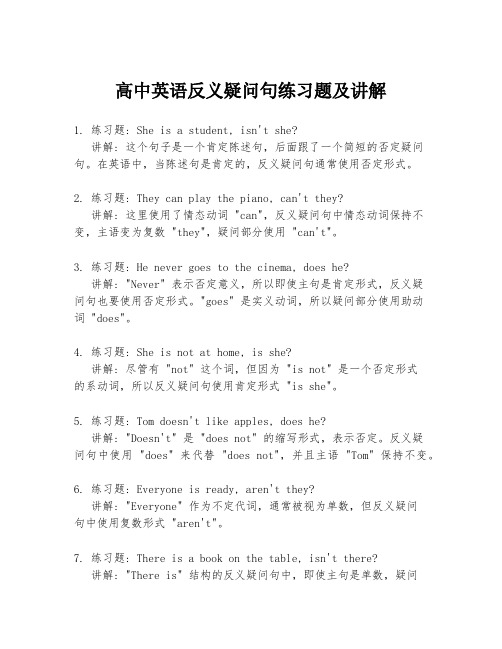
高中英语反义疑问句练习题及讲解1. 练习题: She is a student, isn't she?讲解: 这个句子是一个肯定陈述句,后面跟了一个简短的否定疑问句。
在英语中,当陈述句是肯定的,反义疑问句通常使用否定形式。
2. 练习题: They can play the piano, can't they?讲解: 这里使用了情态动词 "can",反义疑问句中情态动词保持不变,主语变为复数 "they",疑问部分使用 "can't"。
3. 练习题: He never goes to the cinema, does he?讲解: "Never" 表示否定意义,所以即使主句是肯定形式,反义疑问句也要使用否定形式。
"goes" 是实义动词,所以疑问部分使用助动词 "does"。
4. 练习题: She is not at home, is she?讲解: 尽管有 "not" 这个词,但因为 "is not" 是一个否定形式的系动词,所以反义疑问句使用肯定形式 "is she"。
5. 练习题: Tom doesn't like apples, does he?讲解: "Doesn't" 是 "does not" 的缩写形式,表示否定。
反义疑问句中使用 "does" 来代替 "does not",并且主语 "Tom" 保持不变。
6. 练习题: Everyone is ready, aren't they?讲解: "Everyone" 作为不定代词,通常被视为单数,但反义疑问句中使用复数形式 "aren't"。
反义疑问句_语法解析_练习及答案

反义疑问句1 肯定陈述句+否定附加疑问e.g.1 ----He likes chocolates, doesn’t he ? 他喜欢巧克力, 难道不是吗?----Yes, he does.是,他喜欢. No, he doesn’t. 不,他不喜欢.2---They will be away for a time, won’t they? 他们将离开一段时间, 难道不是吗?--- Yes, they will.是, 他们将离开一段时间. No, they won’t. 不,他们不.2 否定陈述句+ 肯定附加疑问e.g. 1 ---It wasn’t cold yesterday, was it? 昨天不冷,是吗?---Yes, it was. 不,很冷。
/ No, it wasn’t. 对,不冷。
2 ---She can’t play the guitar, can she? 她不会弹吉他,是吗?--- Yes, she can. 不,她会。
/No, she can’t. 对,她不会。
3、遵循“前否后肯”或“前肯后否”的原则:4前后两句主语不相同 :主语不一致的若干情况如下(需牢记):1)This/that变It 如; This is your brother, isn’t it?2)These/those 变they 如Those are books, aren’t they?3)Something\anything\everything\nothing 变It如: Nothing is serious, is it?4)Everybody/everyone\Somebody/someone\Anybody/anyone\nobody\no one 变he\they如:Everyone knows this, don’t they? (Everyone knows this, doesn’t he?)5)I am变aren’t I如:I am your friend, aren’t I?6)句中有seldom, hardly, no, not, never, few, little, nothing, nobody, nowhere 等于是否定句,疑问部分必须采用肯定形式:Nobody phoned while I was out, did they?He is hardly able to swim, is he?There is little ink in your pen, is there?7)句中有等否定前缀或后缀un-, im-, dis-,构成的词语时,看作肯定,文句用否定.He dislikes the two subjects, doesn’t he?8)祈使句的反意疑问句Let me …,will you ?let us …,will you?Let him come in, will you?Let’s …,shall we?Let’s go for a walk, shall we?否定的祈使句Don’t +V…will you?Don’t make a noise, will you?表示邀请,请求的肯定祈使句will youCome here, will you?Turn off the light, will you?8)当前面主句是I\we think… I\We believe guess…时, 问句与宾语从句一致.I think she is right, isn’t she?We don’t believe you can pass the exam, can you反义疑问句练习题1.It’s very hot today, _______________ ?2. He can speak Chinese, _______________ ?3. Meimei studies in a middle school, _______________ ?4. He never gets up late , _______________ ?5. Don’t go out at night, _______________ ?6.He never loves cold weather , _______________ ?7. You finished the task yesterday, _______________ ?9.Tom has been to Singapore , _______________ ?10.The story is little interesting, _______________ ?11.Everything starts to grow in spring, _______________ ?12.He can hardly finish his homework, _______________ ?13.I’m in Class 3,Grade 2, _______________ ?14.Let’s go shopping , _______________ ?15.She doesn’t like climbing hills , _______________ ?16.I don’t think it is cold today, _______________ ?19.Few students can answer the question, _______________ ?20.Mike likes English, _______________ ?21.That was a wonderful night, _______________ ?22.Your sister helped him, _______________ ?23.Tom is skating, _______________ ?24.You aren’t a teacher, _______________ ?25.They haven’t been to the Great Wall, _______________ ?26.You will join the soccer team, _______________ ?28.There are some good books for you, _______________ ?29.They have been there twice, _______________ ?30.Let’s do it now, _______________ ?31.You dislike this kind of gifts, _______________ ?32.Nothing is impossible, _______________ ?34.He doesn’t go to school by bus, _______________ ?35.There is little milk left in the bottle, _______________ ?36.Let us clean the classroom by ourselves, _______________ ?37.He has studied here for about four years, _______________ ?38.You have never lost money before, _______________ ?40.Peter could hardly see the words on the blackboard, _______________ ?41.She’s American, _______________ ?42.There will be a volleyball match in our school, _______________ ?43.Don’t smoke in the reading-room, _______________ ?44.I don’t think he is right, _______________ ? .59.No one knows about it, _______________ ?。
(完整版)反义疑问句详细讲解及习题及答案
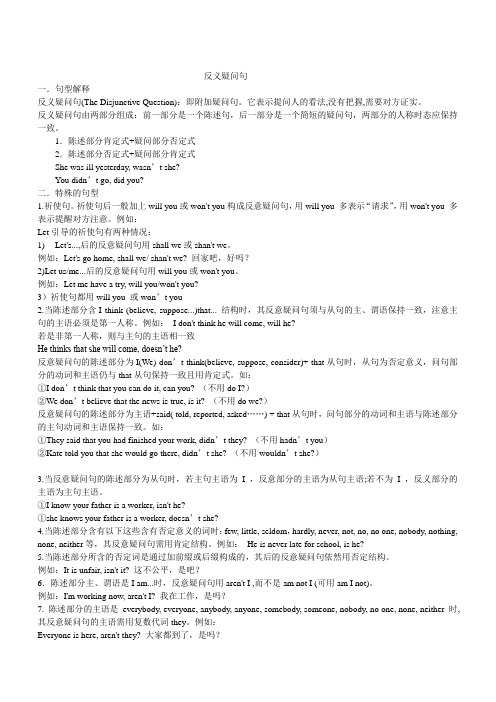
反义疑问句一.句型解释反义疑问句(The Disjunctive Question):即附加疑问句。
它表示提问人的看法,没有把握,需要对方证实。
反义疑问句由两部分组成:前一部分是一个陈述句,后一部分是一个简短的疑问句,两部分的人称时态应保持一致。
1.陈述部分肯定式+疑问部分否定式2.陈述部分否定式+疑问部分肯定式She was ill yesterday, wasn’t she?You didn’t go, did you?二.特殊的句型1.祈使句。
祈使句后一般加上will you或won't you构成反意疑问句,用will you 多表示“请求”,用won't you 多表示提醒对方注意。
例如:Let引导的祈使句有两种情况:1) Let's...,后的反意疑问句用shall we或shan't we。
例如:Let's go home, shall we/ shan't we? 回家吧,好吗?2)Let us/me...后的反意疑问句用will you或won't you。
例如:Let me have a try, will you/won't you?3)祈使句都用will you 或won’t you2.当陈述部分含I think (believe, suppose...)that... 结构时,其反意疑问句须与从句的主、谓语保持一致,注意主句的主语必须是第一人称。
例如:I don't think he will come, will he?若是非第一人称,则与主句的主语相一致He thinks that she will come, doesn’t he?反意疑问句的陈述部分为I(We) don’t think(believe, suppose, consider)+ that从句时,从句为否定意义,问句部分的动词和主语仍与that从句保持一致且用肯定式。
反义疑问句用法及练习题(附答案)

反义疑问句用法及练习题(附答案)反意疑问句用法及练习反意疑问句是指提出情况或者看法,询问对方同意不同意。
这种问句由两部分组成,前一部分是陈述句的形式,后一部分是附着在前一部分上的简短问句,前后两部分要构成反意疑问关系。
又分为两种情况:(1)前一部分为肯定形式,后一部分要为否定形式,即“前肯后否”的形式;或(2)前一部分为否定形式,后一部分则为肯定形式,即“前否后肯”的形式。
具体句式如下:1.0 前肯后否He is a pupil, isn’t he?You are a teacher, aren’t you?We are here, aren’t we?He likes English, doesn’t he?You like English, don’t you?They like English, don’t they?We shall go to the cinema, shan’t we?2.0 前否后肯He isn’t a pupil, is he?You aren’t a teacher, are you?They won’t go to the park tomorrow, will they?I am not a teacher, am I?You haven’t done your homework, have you?3.0陈述部分主、谓语是I am…时,3.1陈述句为肯定句时,反意疑问句用aren't I 或ain't I, 而不是am not I (可用am I not),例如:I'm as tall as your sister, aren't I?I am a doctor, aren’t I?或I am a doctor, ain't I? (慎用)反意问句为否定式时通常要缩写(若不缩写则用较正式的am I not),而am not在标准英语中又没有相应的缩写式,所以人们便用aren’t 来代之。
反义疑问句详解及练习和答案

反义疑问句即附加疑问句。
它表示提问人的看法,没有把握,需要对方证实。
它表示提问人的看法,没有把握,需要对方证实。
反义疑问句由两部分组成:前一部分是一个陈述句,后一部分是一个简短的疑问句,两部分的人称时态应保持一致。
1.陈述部分肯定式+疑问部分否定式2.陈述部分否定式+疑问部分肯定式They work hare, don’t they?She was ill yesterday, wasn’t she?You didn’t go, did you?He can’t ride a b ike, can he?请注意以下句型的反义疑问句的用法:1.当陈述部分的主语是I,而句子又用来征询对方的意见时,附加疑问句中的主语用you。
如:I find English very interesting, don’t you?I don’t like that film, do you?2.当陈述部分的主语是everybody, everyone, someone, nobody, no one, somebody等合成代词时,附加疑问句中的主语通常用they。
但亦可用he,尤其是nobody, no one等作主语,具有否定概念时。
如:Somebody phoned while I was out, didn’t they?Nobody wants to go there, does he?3.当陈述部分的主语是不定代词everything, nothing, anything, something时,附加疑问句中的主语一般用it,不用they。
如:Everything seems all right now, doesn’t it?Nothing is kept in good order, is it?Something must be done to stop pollution, isn’t it?4.当陈述部分的主语是指示代词this, that或these, those时,附加疑问句中的主语分别用it 和they。
中考英语反义疑问句讲解及练习题
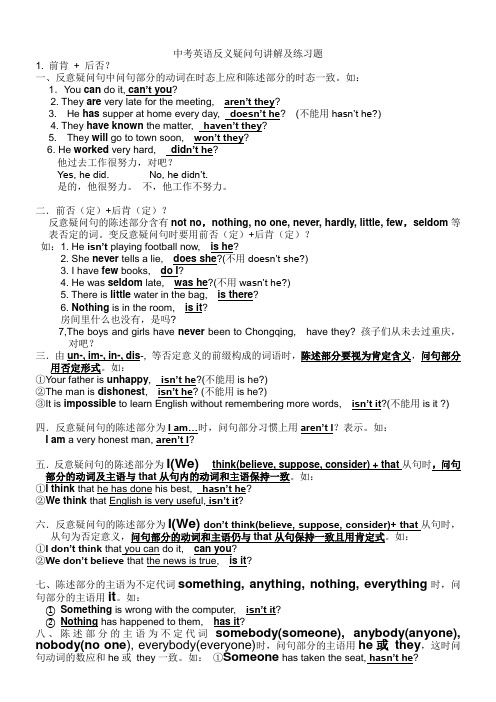
中考英语反义疑问句讲解及练习题1. 前肯+ 后否?一、反意疑问句中问句部分的动词在时态上应和陈述部分的时态一致。
如:1.You can do it, can’t you?2. They are very late for the meeting, aren’t they?3. He has supper at home every day, doesn’t he? (不能用hasn’t he?)4. They have known the matter, haven’t they?5. They will go to town soon, won’t they?6. He worked very hard, did n’t he?他过去工作很努力,对吧?Yes, he did. No, he didn’t.是的,他很努力。
不,他工作不努力。
二.前否(定)+后肯(定)?反意疑问句的陈述部分含有not no,nothing, no one, never, hardly, little, few,seldom等表否定的词。
变反意疑问句时要用前否(定)+后肯(定)?如:1. He isn’t playing football now, is he?2. She never tells a lie, does she?(不用doesn’t she?)3. I have few books, do I?4. He was seldom late, was he?(不用wasn’t he?)5. There is little water in the bag, is there?6. Nothing is in the room, is it?房间里什么也没有,是吗?7,The boys and girls have never been to Chongqing, have they? 孩子们从未去过重庆,对吧?三.由un-, im-, in-, dis-, 等否定意义的前缀构成的词语时,陈述部分要视为肯定含义,问句部分用否定形式。
(完整版)反意疑问句精讲及专项练习(含答案)

反意疑问句在陈述句之后,附加一个简短问句,对陈述部分所述事实或观点提出疑问,叫反意疑问句。
附加问句的谓语动词及主语的形式均须与陈述部分保持一致,且主语必须用人称代词。
反意疑问句须遵循“前肯后否、前否后肯”的原则。
在中考题中,反意疑问句主要考查不同情况下专项练习:1. Tell me how to solve this problem, ____?A. do youB. don't youC. will youD. shan't you2. Half an hour ought to be enough time, ____?A. shouldn't itB. didn't theyC. oughtn't half an hourD. shouldn't half an hour3. They have to go to school now, ____?A. haven't theyB. don't theyC. hadn't theyD. did they4. When the car crashed, your brother escaped being hurt, ____?A. did itB. didn't itC. didn't heD. did he5. I'm dirty, ____?A. am IB. isn't IC. aren't ID. am not I6. That's the sort of the book you want, ____?A. is thatB. isn't itC. is itD. isn't that7. I suppose you're not leaving, ____?A. are youB. don't youC. do youD. aren't you8. I wish to shake hands with you, ____?A shall I B. may IC. do ID. will I9. AIl these dictionaries are a great help to you, ____?A. aren't all theseB. are all these dictionariesC. aren't theyD. are they dictionaries10. The film that we saw last week was quite amazing, ____?A. was itB. wasn't itC. weren't weD. didn't we11. He has been writing letters all afternoon, but he should have finished them by now, ____?A. shouldn't heB. didn't youC. hasn't heD. has he12. We'd rather stay at home tonight, ____?A. isn't itB. hadn't weC. wouldn't weD. won't we13. There appeared to be no better way, ____?A. didn't thereB. were thereC. did thereD. was there14. You had some trouble finding where I live, ____?A. do IB. hadn't youC. didn't youD. don't I15. He has his hair cut every month, ____?A. has heB. hasn't heC. does heD. doesn't he16. Jim told me that he would take a trip to Britain, ____?A. would heB. wouldn't heC. did heD. didn't he17. Jimmy dare not go to church, ____?A. does heB. dare heC. daren't heD. doesn't he18. She would have worked abroad if she'd had the chance, ____?A. wouldn't sheB. would sheC. hadn't sheD. has she19. Everyone is enjoying themselves, ____?A. aren't theyB. isn't everyoneC. does heD. is he20. Anyone can have a meal here, ____?A. can theyB. can't anyoneC. can't theyD. can anyone21. Your friend needs to come earlier, ____?A. need heB. needn't heC. does heD. doesn't he22. Jenny scarcely comes to visit you, ____?A. does sheB. doesn't sheC. do youD. don't you23. Let's listen to the radio program that the teacher mentioned, ____?A. don't weB. do weC. shall weD. shan't we24. The teacher had a talk with you, ____?A. has youB. hadn't sheC. did sheD. didn't she25. You think you're funny, ____?A. do youB. are youC. don't youD. didn't you26. Janet used to take part in labor in that village, ____?A. used sheB. did sheC. didn't sheD. should she27. What a beautiful flower, ____?A. doesn't itB. isn't itC. won't itD. is it28. No one will believe how difficult his work has been, ____?A. will heB. won't nobodyC. will theyD. won't they29. You must have made the mistake, ____?A. mustn't youB. haven't youC. didn't youD. hadn't you30. Learning how to repair computers takes a long time, ____?A. isn't itB. aren't theyC. doesn't itD. don't they31. Tom has milk with breakfast, ____?A. hasn't TomB. hasn't heC. doesn't TomD. doesn't he32. They must have stayed at hotel last night, ____?A. mustn't theyB. haven't theyC. didn't theyD. hadn't they33. Something'll have to be done about the air pollution, ____?A. won't itB. will itC. has itD. does it34. You must be hungry, ____?A. must youB. mustn't youC. are youD. aren't you35. She had the clothes cleaned, ____?A. had sheB. hadn't sheC. didn't sheD. didn't her daughter36. There isn't anything wrong with the car, ____?A. is thereB. is itC. does itD. does there答案:1-5 CABCC 6-10 BABCB 11-15 ACCBD 16-20 DBAAC 21-25 DACDC 26-30 CBABC 31-36 DCADCA。
反意疑问句-讲解与练习
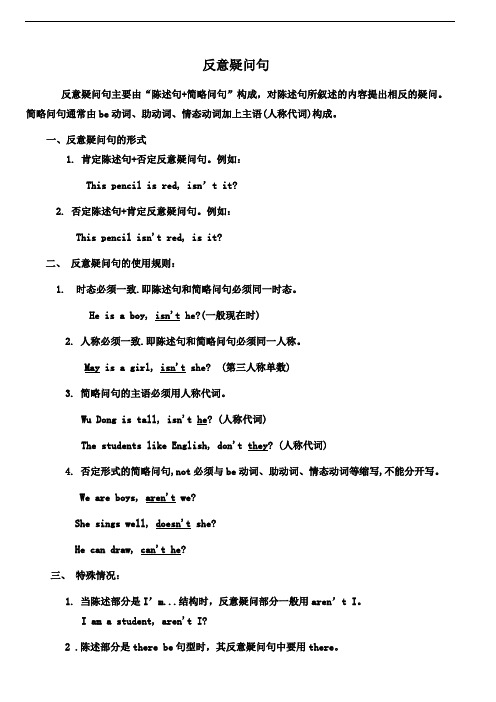
反意疑问句反意疑问句主要由“陈述句+简略问句”构成,对陈述句所叙述的内容提出相反的疑问。
简略问句通常由be动词、助动词、情态动词加上主语(人称代词)构成。
一、反意疑问句的形式1. 肯定陈述句+否定反意疑问句。
例如:This pencil is red, isn’t it?2. 否定陈述句+肯定反意疑问句。
例如:This pencil isn't red, is it?二、反意疑问句的使用规则:1. 时态必须一致.即陈述句和简略问句必须同一时态。
He is a boy, isn't he?(一般现在时)2. 人称必须一致.即陈述句和简略问句必须同一人称。
May is a girl, isn't she? (第三人称单数)3. 简略问句的主语必须用人称代词。
Wu Dong is tall, isn't he? (人称代词)The students like English, don't they? (人称代词)4. 否定形式的简略问句,not必须与be动词、助动词、情态动词等缩写,不能分开写。
We are boys, aren't we?She sings well, doesn't she?He can draw, can't he?三、特殊情况:1. 当陈述部分是I’m...结构时,反意疑问部分一般用aren’t I。
I am a student, aren't I?2 .陈述部分是there be句型时,其反意疑问句中要用there。
There was a hospital here, wasn't there?3. let's引导的祈使句,简略问句应用shall we?Let's go to school, shall we?四、据实回答1. 反意疑问句的回答,要以事实为依据,与说话人的看法无关.如事实是肯定的,用yes作肯定回答,反之,用no作否定回答。
反义疑问句讲解及习题及答案
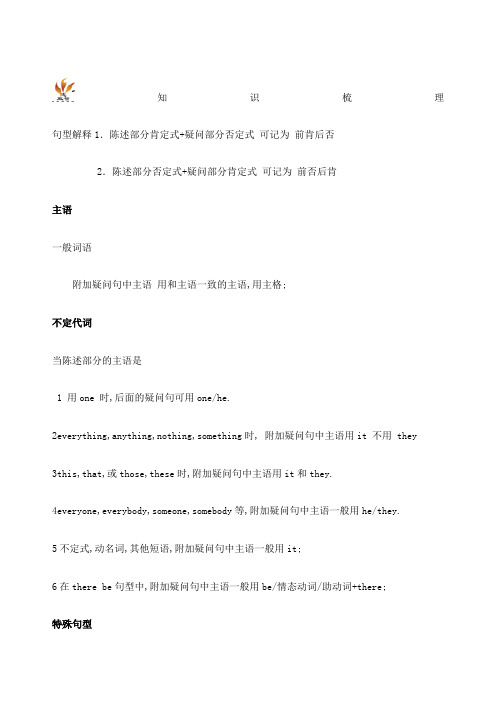
知识梳理句型解释1.陈述部分肯定式+疑问部分否定式可记为前肯后否2.陈述部分否定式+疑问部分肯定式可记为前否后肯主语一般词语附加疑问句中主语用和主语一致的主语,用主格;不定代词当陈述部分的主语是1 用one 时,后面的疑问句可用one/he.2everything,anything,nothing,something时, 附加疑问句中主语用it 不用 they3this,that,或those,these时,附加疑问句中主语用it和they.4everyone,everybody,someone,somebody等,附加疑问句中主语一般用he/they.5不定式,动名词,其他短语,附加疑问句中主语一般用it;6在there be句型中,附加疑问句中主语一般用be/情态动词/助动词+there;特殊句型否定意义的词否定意义的词1当陈述部分有never,seldom, hardly,few,little,barely, scarcely, nothing 等否定意义的词时,后面的反意疑问句则为肯定形式:There are few apples in the basket, are thereHe can hardly swim, can heThey seldom come late, do they2当陈述部分含有否定意思的词是unhappy,dislike,unfriendly等含有否定词缀的派生词,也就是有un-前缀、-less后缀等含有词缀而意思否定的词,当做肯定句处理,疑问部分要用否定形式;如:He looks unhappy,doesn't he他看上去不高兴,不是吗The girl dislikes history,doesn't she这女孩不喜欢历史,不是吗有less,fewer 等词视为肯定词,疑问部分用否定形式;如:There will be less pollution, won't there 表示主语主观意愿的词含有think, believe, suppose, imagine, expect等动词后接宾语从句构成的主从复合句在构成反意疑问句时,视情况不同有两种不同的构成方式;1.当主句的主语为第一人称时,其后的简短问句应与从句相一致;例如:I expect our English teacher will be back this weekend, won't she/heWe suppose you have finished the project, haven't you值得注意的是,当这些动词后接的宾语从句的否定转移到主句时,其仍属否定句,故其后的简短问句应用肯定式,而非否定式;例如:I don't believe that he can translate this book, can heWe don't imagine the twins have arrived, have they此类句子的回答同"前否后肯"型反意疑问句一样,如上述后一个句子,若双胞胎已经到了,则回答为"Yes, they have.";若尚未到达,使用"No, they haven't.";2.当主句的主语为第二、三人称时,其后的简短问句则应与主句相一致此时,否定只看主句,与从句无关...;例如:Your sister supposes she needs no help, doesn't sheYou thought they could have completed the project, didn't youThey don't believe she's an engineer, do theyShe doesn't expect that we are coming so soon, does she3但如果主句的时态是过去时等等,疑问句应和主句的人称时态保持一致;had better或have陈述部分有had better,或其中的have表示完成时态时,疑问句应用hadn’t等开头:You’d better get up early, hadn’t you其他情况句中有have时疑问句应用don't等开头如have表示“有”的时候,有两种形式:-He has two sisters,doesn't he-He doesn't have any sisters,doe she祈使句当陈述部分是祈使句时,疑问句要根据语气来表达当开头是Let‘s时,一定要用shall we;其余都用will you包括 Let us不论肯定否定Let’s go out for a walk, shall weLet us go out for a walk, will youLet me help you,may ITurn on the radio, will youThere be句型There be 句型中,反义疑问部分必须为be 动词 + thereThere are some apples in the basket, aren't thereThere isn't any milk left, is theremust.当陈述部分有情态动词must,问句有4种情况:1mustn't表示“禁止,不可,不必”时,附加问句通常要用must.You mustn't stop your car here,must you 你不能把车停在这地方,知道吗2must表示“有必要”时,附加问句通常要用needn't.They must finish the work today,needn't they 他们今天要完成这项工作,是吗3当must用来表示对现在的情况进行推测时,问句通常要根据must后面的动词采用相应的形式; He must be good at English,isn't he 他英语一定学得很好,是吗4当must+have done表示对过去的情况进行推测一般句中有明确的过去时间状语,问句要根据陈述部分谓语的情况用“didn't+主语”或“wasn't/weren't+主语”;如果强调动作的完成一般没有明确的过去时间状语,问句要用“haven't/hasn't+主语”;She must have read the novel last week,didn't she 她上星期一定读了这本小说,是吗You must have told her about it,haven't you 你一定把这事告诉她了,是吗回答反意疑问句的回答用yes, no, 但是,回答意思相反,当陈述部分是否定形式时,回答要按事实;如:They don’t work hard, do they 他们不太努力工作,是吗Yes, they do. 不,他们工作努力;/No, they don’t. 对, 他们工作不努力肯定反意疑问句的回答当陈述部分为否定式,反意疑问句为肯定式时,其回答往往与汉语不一致,需特别引起注意:"It isn’t cheap, is it" "Yes, it is." “它不便宜吧”“不,很便宜;”"He doesn’t love her, does he" "No, he doesn’t."“他不爱她,是吗”“是的,他不爱她;”此时,"Yes"即不,对前面"It isn't cheap."的否定;否定反意疑问句的回答当陈述部分为肯定式,反意疑问句为否定式时,其回答一般不会造成困难,一般只需照情况回答即可:"It’s new, isn’t it" "Yes, it is." “是新的,对吗”“对,是新的;”"He wants to go, doesn’t he" "No, he doesn’t." “他想去,对吗”“不,他不想去;”此时,"Yes"即是,对前面"It's new."的肯定;回答反意疑问句的原则回答反意疑问句通常应根据实际情况来确定,如有人问你You are asleep, aren’t you 你应回答No, I’m not. 因为既然你能回答,肯定你还没有asleep;但如果别人问你 You aren’t asleep, are you你还没有睡着,对吗,你也只能回答No, I’m not.是的,还没有睡着,而不能回答为Yes, I’m not. 也不能回答成 Yes, I am.“It is a beautiful flower,isn't it”“It isn't a beautiful flower,is it”上述两句句子的回答肯定均为“Yes,it is."否定为“No,it isn't."由上述例子可知,反义疑问句回答与句子本身所包含的中文肯定与否的含义并无太大关联,只需注意事实,肯定即用yes,否定用no,无需考虑句子原本是前否后肯或是前肯后否;反义疑问句练习典题精析1. Linda ate nothing this morning, ___A. didn’t sheB. was sheC. did sheD. wasn’t she2. There’s hardly___ milk in the bottle, _____thereA. no, isn’tB. some, isC. little, isn’tD. any, is3. He has never ridden a horse before, ___A. does heB. has heC. hasn’t heD. doesn’t he4. — He seldom came here, _____— Yes sir.A. didn’t heB. does heC. doesn’t heD. did he5. Everything seems all right, _____A. does itB. don’t theyC. won’t itD. doesn’t it6. One can’t be too modest, can _____A. oneB. heC. itD. we7. No one failed in the exam, _____A. was heB. did oneC. did theyD. didn’t he8. Neither you nor I am an artist, _____ A. am I B. aren’t we C. are we D. ain’t I9. He can’t be her father, _____ heA. isB. isn’tC. canD. can’t10. They have no time to visit the museum, _____A. do theyB. haven’t theyC. don’t theyD. will they11. You’d better go at once, _____ youA. hadn’tB. didC. didn’tD. don’t12. You’d rather work than play, _____ youA. hadn’tB. wouldn’tC. didn’tD. mustn’t13. You dare not do that, _____ youA. don’tB. doC. dareD. daren’t14. He dislikes the two subjects, _____ heA. doesB. doesn’tC. isD. isn’t15. These tools are useless now, _____A. are theyB. aren’t theyC. is itD. isn’t it16. He used to get up at 6:30, _____ he A. didn’t he B. did he C. used he D. wouldn’t he17. He ought to win the first prize, _______ heA. mustn’tB. oughtn’tC. shouldn’tD. Both B and C.18. Let’s go there by bus, ___A. will youB. shall weC. don’t youD. will you19. Let us go to play football, ___A. will youB. shall weC. do weD. are we20. Don’t forget to give Polly some food and change her water, ___A. will youB. shall weC. won’t youD. do you21. —Let’s go shopping this afternoon, _____— All right.A. will weB. shall weC. don’t weD. are we22. — Pass me the dictionary, _____— Yes, with pleasure.A. would youB. will youC. won’t youD. wouldn’t you23. There is little water in the glass, ____ A. isn’t there B. isn’t it C. is it D. is there24. There won’t be any concert this Saturday evening, _____A. will there notB. will thereC. is thereD. won’t25. — I guess she taught herself Japanese, ______— Yes.A. don’t IB. did sheC. do ID. didn’t she26. I don’t believe you are right, _____A. are youB. do youC. won’t youD. do27. She doesn’t think that Tom sings best in the class, _____A. does sheB. doesn’t sheC. does heD. doesn’t he28. I know you didn’t want to hurt me, _____A. did youB. didn’t youC. do ID. don’t I29. If my father were here he would be very happy, _____ A. weren’t he B. were he C. wouldn’t he D. would he能力提升1. It’s the third time that John has been late, ____A. hasn’t heB. isn’t heC. isn’t itD. hasn’t it2. Let’s take a rest, ___________.A. will weB. shall weC. shan’t weD. won’t we3. Let us pass, _________ A. shan’t we B. shall we C. won’t we D. will you4. Wait a minute, __________A. shall youB. will youC. do youD. don’t you5. The suit’s finished, __________ A. doesn’t it B. isn’t it C. haven’t you D. hasn’t it6. He’s posted the letter, _________he A. isn’t B. doesn’t C. hasn’t D. wasn’t7. They’d go with us, __________A. wouldn’t theyB. didn’t theyC. hadn’t theyD. couldn’t they8. What fresh air, ________ A. is it B. does it C. isn’t itD. doesn’t it9. The Emperor’s clothes became the talk of the whole city, _________A. did itB. didn’t itC. did theyD. didn’t they10.Mr. And Mrs. Turner work in this hospital, ________A. are theyB. aren’t theyC. do theyD. don’t they11. She has breakfast at six every day, ________A. has sheB. hasn’t sheC. does sheD. doesn’t she12. Nothing seems to please her, _________ A. does it B. doesn’t it C.is it D. isn’t it13. She never tells a lie, ________ A. does she B. doesn’t she C. is itD. isn’t it14. You hardly know each other, _________A. do youB. don’t youC. have youD. didn’t you15. The man in blue must be your brother, _____A. mustn’t heB. needn’t heC. isn’t heD. is he16. I don’t think he will come to our party, _____A. will heB. won’t heC. does heD. do I17. I suppos e he’s serious, ___________A. do IB. don’t IC. is heD. isn’t he18. Wang said that he was not there then, _____A. did heB. didn’t heC. was heD. wasn’t he19. You daren’t say that to him, _________A. dare youB. do youC. daren’t youD. don’t you20. You must have read about Dickens long ago, __________A. mustn’t youB. haven’t youC. can’t youD. didn’t you随堂小测三智题库QYF21. You’d better not smoke here, ________A. will youB. shall youC. have youD. had you22.There isn’t going to be a volleyball match next week, __________23. A. is it B. isn’t it C. is there D. isn’t there23. There used to be a church behind the cemetery, _____________A. didn’t thereB. used thereC. usedn’t itD. didn’t it24. What a lovely day, _________ A. doesn’t it B. hasn’t it C.won’t D. isn’t it25. You must have been there, ____________A. have youB. did youC. haven’t youD. didn’t you26. That is your school, ___________A. isn’t thatB. mustn’t itC. isn’t itD. won’t it27. She dislikes this skirt, _________________A. doesn’t sheB. does sheC. isn’t sheD. is she28. No one can stop us from going there, ______A. can’t itB. can theyC. can’t theyD. can one师生互动分数评语错题归档确认答案典题精析. 1-5 CDBDD 6-10 ACCAA 11-15 ABCBB 16-20 ADBAA 21-25 BBDBD 26-29 AAAC 能力提升. 1-5 CBDBB 6-10 CACDD 11-15 DAAAC 16-20 ADBAD随堂小测21-25 DCADC 26-28CAB。
绝对原创的反义疑问句的讲解加练习

3. Let us的反义疑问句用will you?
练:Let us have a rest,?
特例4
have to +v. (had to + v.)
反意疑问句的助动词用doห้องสมุดไป่ตู้does/did。
例:Wehave toget there at eight tomorrow,don'twe?
练
习
完成下列反义疑问句。
Be动词
1. You are an actor, ___________? 2. He is a good boy, ___________?
3. It was fine yesterday, ___________? 4. She is going to visit me, ___________?
He never fights with others,?
She is hardly late for class,?
2.否定前缀un-, dis-, im等不能视为否定词,其反意疑问句仍用否定形式。
例:It isimpossible,isn'tit?
练:She is unhappy,?
It’s impolite to shout at others,? It’s important to exercise,?
2.A: Johndoesn’t like swimming, does he?
B1:_______. And he swims every weekend.
(Yes, he does./ No, hedoesn’t./ Yes,hedoesn’t/ No,he does.)
- 1、下载文档前请自行甄别文档内容的完整性,平台不提供额外的编辑、内容补充、找答案等附加服务。
- 2、"仅部分预览"的文档,不可在线预览部分如存在完整性等问题,可反馈申请退款(可完整预览的文档不适用该条件!)。
- 3、如文档侵犯您的权益,请联系客服反馈,我们会尽快为您处理(人工客服工作时间:9:00-18:30)。
反义疑问句讲解练习I.有关反意疑问句1. 反意疑问句的基本形式:由一个陈述句加简短问句构成。
Eg:He is a teacher,isn’t he?2. 前面肯定,后面否定;前面否定,后面肯定Eg:I can swim,can’t I ?I can’t swim,can I ?3. 前面主语不管是什么,后面的主语一定是代词(there除外)Eg:1.The boy is your brother, isn’t he?2.Peter sings well,doesn’t he?3. There is some water in the bottle, isn’t there?4. 前面有表否定的词,后面加肯定.常见的词有:no, not, nothing, none, nobody, few,little, never, neither, hardly, nowhere, seldomEg: There is little water in the bottle, is there?5. 祈使句,一般都用+will you?例外:1.Let’s…,+shall we? /2.Let us…,+will you?6. 感叹句+isn’t it? What a nice day, isn’t it?7. 前面是I am,后面用aren’t I前面是I am not,后面用am I.I am sad,aren’t I ?I am not sad,am I ?8. 含有否定un-,in-,im-,il-,ir-,dis-,-less前缀后缀的派生词,后面还是照常加否定形式.Eg: She dislikes it, doesn’t she?You are hopeless, aren’t you?9. 含有宾语从句的主从复合句,疑问部分与主句一致。
但是,主语为第一人称I, we, 后面的动词为think, believe, expect, feel, suppose, imagine时,问句部分跟从句保持一致。
Eg:1.He thinks you are wrong, doesn’t he?2.I don’t think you are right, are you?10. must表示推测时,必须跟must后面的动词eg:1.He must be happy, isn’t he?2.He must be at home, isn’t he?11.前面用this, that, something, anything, everything做主语,则后面用it。
Eg: Something is wrong with it, isn’t it?12. 前面用these, those, nobody, somebody做主语,则后面用they。
Eg: Everybody is here today, aren’t they?II. 完成下列反意疑问句。
1. Mr Li is a scientist, _________?2. We were going to the bus stop, _________?3. Ann wasn’t in trouble, ________?4. They aren’t reading the books, _________?5. You are from the north of China, ________?6. I am to finish the job, ___________?7. I am not to finish the job, __________?8. There were a lot of apples,___________?9. We went to the park yesterday, _________?10. Tom hasn’t been to America, _________?11. Pat has lunch at home, _____________?12. Ann and Tom will not study hard, ______?13. She ate two bananas, _____________?14. They have many friends, ___________?15. Anne and Sue have come already, _____?16. Peter didn’t go home, ____________?17. Wendy can’t swim, ____________?18. They must stay at home, _________?19. I need write a letter, __________?20. He shouldn’t make trouble, _________?21. Please open the window, ____________?22. Don’t make so many noises, ________?23. Let’s have a talk now, __________?24. Let us do it by ourselves, _______?25. The Great Wall is beautiful, ________?26.We must try our best, ____________?27. You have no classes, __________?28. Patsy can hardly see, ________?29. Let’s catch the thief, __________?30.Let us decide it alone, __________?31.They did it ,__________?32. You aren’t leaving,_________?33. Mr. White wasn’t there ,________?34.We believe he is right,_____ ______?35.She was unhappy,_____ _______?36.You did nothing, ____ _______?37.Some of them belong to her,_____ ____?38.She must be late, ______ _________?39.I think that he is clever,______ ______?40.You must be very tired, ____ _____?41. Everything looks boring, _____ ______?42.Nobody called you while you were out, __?43. I don’t think he will come to our party, ____ _____?44. You’d better not smoke here, ____ ____?45. What a lovely day, _____ ____?III. 选择最佳答案。
1. He was late for school that morning, ____?wasn’t he B. was he C. did he D. didn’t he2. Sue will have lunch at school, _______?doesn’t she B. won’t she C. is she D. will Sue3 She doesn’t talk much, ______?A. is heB. doesn’t sheC. did sheD. does she4. There is going to be a fire drill this afternoon, ______?A. is thereB. is going thereC. isn’t thereD. did there5. She has a brother and sister, ______?A. hasn’t sheB.has sheC.don’t sheD. does she6. He must be our English teacher,______?A. must heB. doesn’t heC. mustn’t heD. isn’t he7. Mary lost her pen, _____?A. didn’t sheB. didn’t MaryC. doesn’t sheD. wasn’t she8. He can hardly believe it, ________?A. can’t heB. can heC. is heD. cannot he9. Somebody told me about it yesterday, ___?A. did theyB. didn’t somebodyC. didn’t theyD. did he10. We do morning exercises in the morning, _______?A. do weB. did weC. didn’t weD. don’t we11. The Arab has never seen such a camel, __?A. hasn’t heB. has the ArabC. did heD. has he12. She does well in English, ________?A. doesn’t sheB. does sheC. did sheD. isn’t she13. There is little food left at home, ______?A. isn’t thereB. is thereC. are thereD. aren’t there14. She doesn’t much care for a car, ______?A. is sheB. does sheC. doesn’t sheD. did she15. You don’t think so, ________?A. don’t youB. aren’t youC. are youD. do you16. They have never been to the Summer Palace, __? A. have they B. haven’t you C. don’t you D. aren’t you17. Kate’s uncle will go to Paris for his holiday,_______? A. won’t he B. will he C. doesn’t he D. isn’t he18. Your father can speak German, _____?A. does heB. is heC. doesn’t heD. can’t he19. You’d better argue with her, _____?A. didn’t youB. don’t youC. hadn’t youD. did you20. Nothing is impossible, _________?A. do weB. did weC. is itD. isn’t it21. Let us have a rest, ________?A. will youB. shall weC. do youD. don’t we22. Most of the money has been spent, ____?A. have theyB. haven’t theyC. has itD. hasn’t it23. He must have passed the exam, _______?A. mustn’t heB. hasn’t heC. has heD. didn’t he24. He has to save everything, _________?A. don’t heB. does heC. doesn’t heD. Have he Answers to the questions:II. 1. isn’t he2. were’t we3. was she4. are they5. aren’t you6. aren’t I7. am I8. weren’t there9. didn’t we10. has he11. doesn’t she12. will they13. didn’t she14. don’t they/ haven’t they15. haven’t they16. did he17. can she18. needn’t they/mustn’t they19. needn’t I20. should he21. will you22. will you23. shall we24. will you25. isn’t it26. mustn’t we27. do you28. can she29. shall we30. will you31. didn’t they32. are you33. was he34. isn’t he35. wasn’t she36. did you37. don’t they38. isn’t she39. isn’t he40. aren’t you41. doesn’t it42. did they43. will he44. hadn’t you45. isn’t itIII. 1-5 ABDCA6-10 DABCD 11-15 DABBD16-20 AADCC21-24 ADBC。
